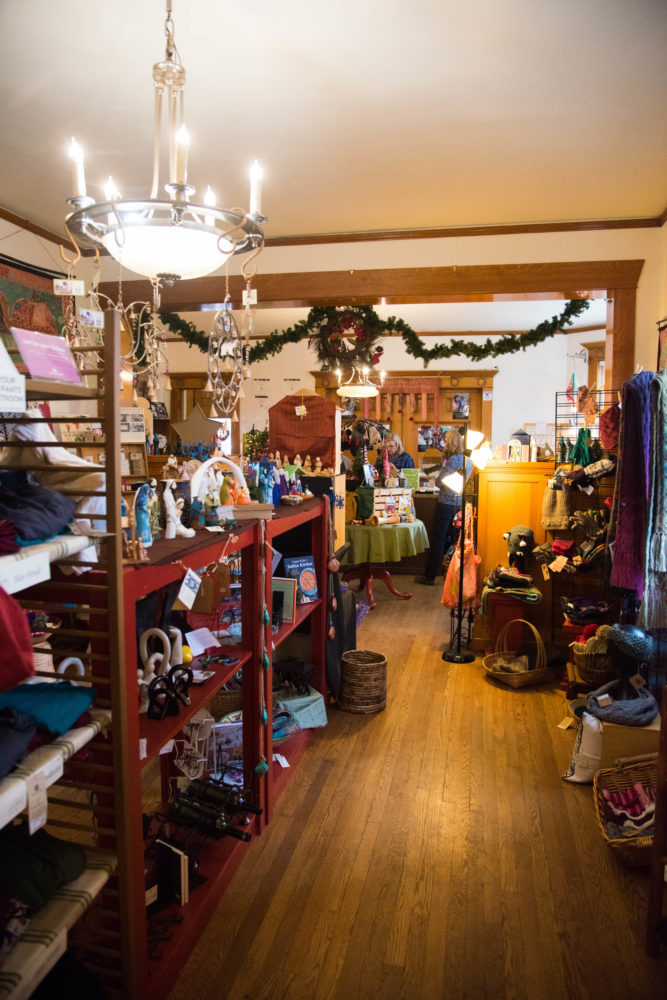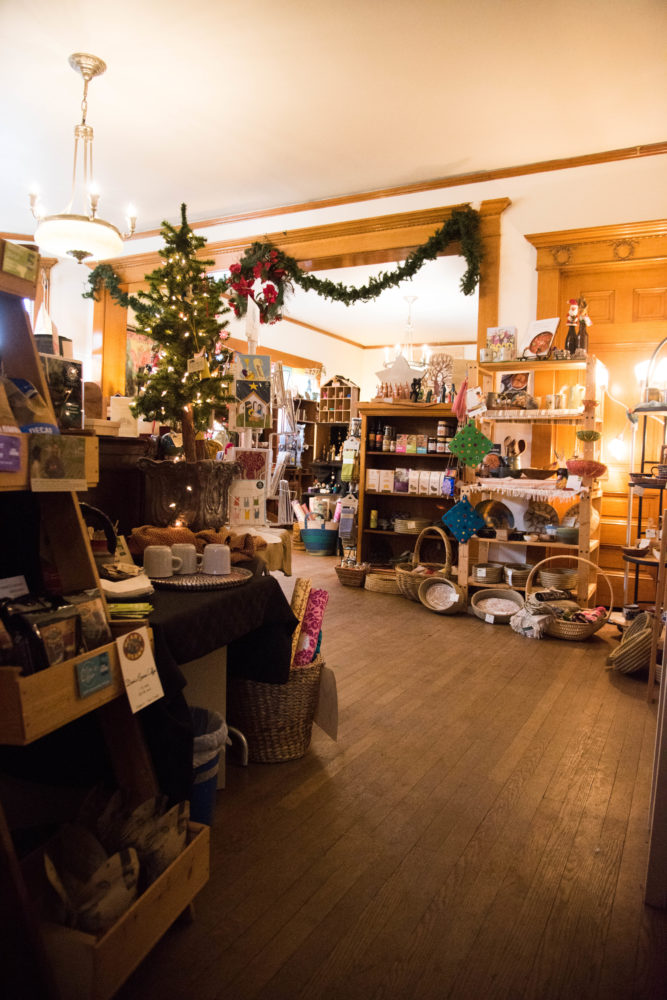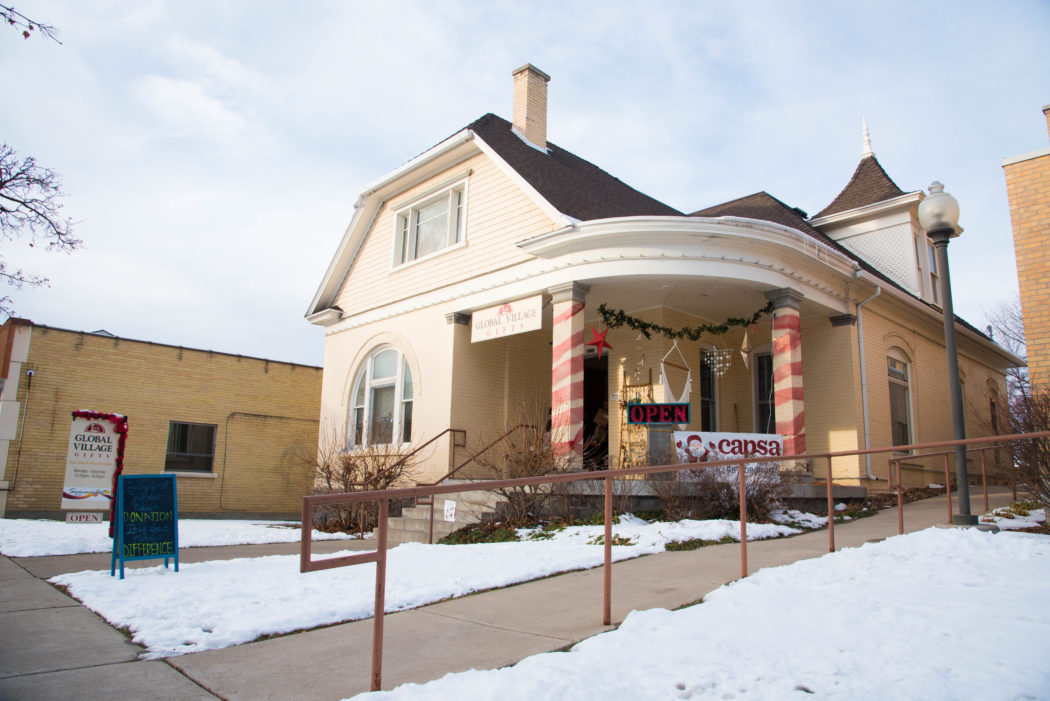Every gift has a story at local fair trade market
Local boutique Global Village Gifts is encouraging Cache Valley residents to “purchase with a purpose” this holiday season by buying fair trade.
Fair trade is a way of doing business that focuses on principles such as environmental stewardship, safe working conditions and fair wages for employees and artisans. Fair trade businesses often focus on developing nations who are typically taken advantage of.
The non-profit boutique is the only store of its kind that has stayed open in Utah and is largely run by volunteer workers who are often Utah State University students.
“I spent some time living and traveling abroad, so I’ve seen first-hand what life is like for people in a lot of the countries we have in our store,” said Becca Huppi, Global Village Gifts volunteer coordinator and a graduate of USU who started volunteering in 2014. “I loved the skill and the craft that artisans in other countries had. When I found out we had a store that sold those beautiful products and also supported those artisans, helping them have a better lifestyle and fairly compete in the global market, I thought it was the coolest thing ever. I fell in love with the mission of the store.”
Students have the opportunity to volunteer year-round at the boutique. The store is considerably busier during the holiday season, said Anna Maki, a recent USU graduate who began volunteering for Global Village when she took a nonprofit management class.
“One of the main items we bring in for the holidays is nativities from around the world,” she said. “They are usually handcrafted and are a big seller. The store also sells really good knitwear, like scarves and hats and gloves. There’s so much to see. You can spend three hours in the store and see something for the first time when you look at the bottom shelf.”
 Chantelle Mccall
Chantelle Mccall Before she graduated this month, Maki worked with the Sustainability Club to begin a fair trade campaign on the Utah State University campus. The campaign is pushing for fair trade products in the campus store and campus dining.
“One of my favorite quotes that applies to shopping fair trade is, ‘Every dollar we spend is casting a vote for the kind of world we want,’” Maki said. “It’s an easy way for people to make a big difference.”
Clarissa Swain, a store manager and USU graduate, believes the reason why some may not understand the importance of shopping fair trade is because they already live a privileged lifestyle.
“We already have safe working conditions and access to all the resources we need to live,” she said. “It’s a responsibility of ours to help people who aren’t in the same situation we are. When you shop fair trade, you are putting your money into something meaningful.”
After stepping in to Global Village Gifts, one immediately sees shelves full of artisan chocolates to the left and handmade jewelry to the right. In addition to a handful of handcrafted Christmas nativities, the boutique is also full of stocking-stuffers like organic coffee, worry dolls, recycled paper notebooks and botanical soaps.
“You’ll find gifts you won’t find anywhere else in Logan. Everything is so beautiful and handmade,” Huppi said. “You can shop there with confidence, knowing that the money you spend goes back to the artisans and developing nations. It’s a good way to give a gift but also to give back in a global way.”
Swain said each gift at global village has a purpose and a story, making them more meaningful to the purchaser and receiver.
“Whether the object gifted from Global Village is made by a group of people in Cambodia or an artisan in India, the story behind it makes people more aware of where their gifts come from,” Maki said. “It doesn’t change the world, but it changes the lives of the artisans creating the products.”
Maki believes college students ought to be more conscious about where their products come from and contemplate why some items are sold for cheap prices from large corporations.
“As students, we are educating ourselves and part of that comes with an obligation to help the world,” she said. “Buying fair trade is one of those ways. It’s a step in the direction of equality.”
 Chantelle Mccall
Chantelle Mccall Because money used to purchase fair trade gifts goes straight back to the artisans who created the products and cuts out middlemen, buying fair trade isn’t as expensive than one might think, Huppi said.
“The price is actually is very comparable to non-fair trade products,” she said. “The money is going back to the people who directly made the items, rather than into the pockets of big corporations and the cost they have to run their administrative teams. Because Global Village is run by volunteers, we don’t have to pay salaries and don’t have as much of a markup on products as large corporations do.”
As the only fair trade store that has stayed open in Utah, the employees of Global Village Gifts are grateful for the considerate and conscious members of Cache Valley.
“It’s so cool that we have something like this in such small town,” Huppi said. “The people that shop there are incredible, and the people that work there are so great. They’ve traveled the world and have seen the difference this makes. We are thankful to the community that supports us.”
Students who wish to be involved with the fair trade campaign on campus can contact the Aggie Sustainability Club. Those who want to volunteer at Global Village Gifts can fill out an application on the boutique’s website.
— mekenna.malan@gmail.com
@kennamalan

